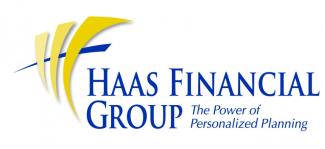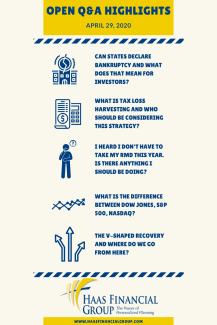Open Q&A Highlights - April 29
Listen To The Full Discussion Here
Don't have time for the full 40 minutes? Transcript highlights are listed below or click here:
Intro: 0:00 – 3:30
Topics Included:
- Can States declare bankruptcy and what would that mean for investors? (3:30)
- Headline from Senator Mitch McConnell when asked if federal CARES Act money could be used to support states and state pensions that are underfunded. He said he’d rather have states file for bankruptcy than bail out their pensions.
- Politically charged comment. States can’t actually file for bankruptcy. They are sovereign entities. Bankruptcy process can be applied for by municipalities, but tough to do.
- For investors, it’s budgets, revenues, debts and defaults. Governments have the ability to refinance debt, the ability to restructure, and raise taxes. So have to review their credit quality (i.e. - credit score).
- Not all bonds are created equal and safe. 70% of municipal bond market is are high quality but something like high yield bonds pay a higher interest rate, but aren’t as safe (lower credit quality).
- What is tax loss harvesting and who should be considering this strategy? (9:00)
- Leads back to financial planning and bucketing. There are three different tax buckets according to the IRS:
- Tax deferred bucket – most retirement accounts sit here. Won’t pay income taxes until you withdrawal money. Buying and selling doesn’t matter.
- Tax-free bucket – put money in and have already paid taxes upfront. Buying and selling doesn’t matter.
- Taxable bucket – you’ve paid income taxes on, saved it, and chose to invest it and you pay those taxes on profits as you go. Tax loss harvesting is this bucket. When you have gains, those gains can be offset by losses when you have them. Harvesting the losses is the taking the action sell.
- Coordinate with your tax preparer. Recognize that there is a difference between income taxes and gains taxes. You can only claim losses up to net $3,000. You don’t lose them though, you can carry forward those losses into future years. It is important to have good record keeping to carry forward.
- Leads back to financial planning and bucketing. There are three different tax buckets according to the IRS:
- I heard I don't have to take my RMD this year, if I don't need the money, is there anything I should be doing? (13:30)
- Because of the CARES Act we don’t have to take your Required Minimum Distribution (RMD) this year.
- But you may choose to take it out anyway, pay the taxes, and move it to your Roth IRA where you never have to pay taxes on it again. This is called a Roth conversion. The money would grow tax free forever, for you and your heirs.
- You could put your RMD back in if you took it already and don’t need it.
- Or, if you typically gift directly from your IRA to charity to avoid the income taxes, don’t have to this year. Find something else to gift that could provide you tax benefits.
- Because of the CARES Act we don’t have to take your Required Minimum Distribution (RMD) this year.
- Difference between Dow Jones, S&P 500, NASDAQ? (18:00)
- Dow Jones is 30 companies, which represent a lot of different segments and sizes. Therefore one company who isn’t performing well could drag the performance down (i.e. – Boeing’s recent struggles)
- S&P500 is the 500 largest U.S. based companies.
- NASDAQ is 3000 companies, much broader segments.
- Not apples to apples to the investor because most investors are diversified. Hard to parallel your specific performance without looking into the weeds of what you currently own.
- If you are invested solely in stocks, and the S&P500 is down for the day, you’re probably down for the day too. But if you’re mostly in bonds, the S&P500 being down for the day would not be a fair parallel.
- You can get access to companies in a lot of different ways. For example, mutual funds have a lot of different companies in one package.
- Big companies are probably in all 3.
- What is everyone doing to stay busy and see the silver lining through this tough time? (24:30)
- Ben is busy with his family, home projects, woodworking, and of course – working! He is glad to have all of his meats! He is enjoying the extra time with family and making their house their home.
- The V-shaped recovery being talked about and where do we go from here? (28:30)
- Investment commentary is abundant right now. Who really knows where we go from here? It’s important to stay diversified and it’s ok to be fearful.
- How quick is that rebound going to be and when will that happen? Market seems to be focused on the positive. The market seems to show that this isn’t going to be too long and tries to project things forward and interpret data, even if it’s really bad.
- It’s also important to note that the economy is not the market. The market has historically rebounded 4-5 months earlier than the economy will. So, this could be a short recession.
- End (42:00)
The opinions voiced in this material are for general information only and are not intended to provide specific advice or recommendations for any individual.
All investing involves risk including loss of principal. No strategy assures success or protects against loss. There is no guarantee that a diversified portfolio will enhance overall returns or outperform a non-diversified portfolio. Diversification does not protect against market risk.
The economic forecasts set forth in this material may not develop as predicted and there can be no guarantee that strategies promoted will be successful.
This information is not intended to be a substitute for specific individualized tax advice. We suggest that you discuss your specific tax issues with a qualified tax advisor.
Tracking # 1-05006069


